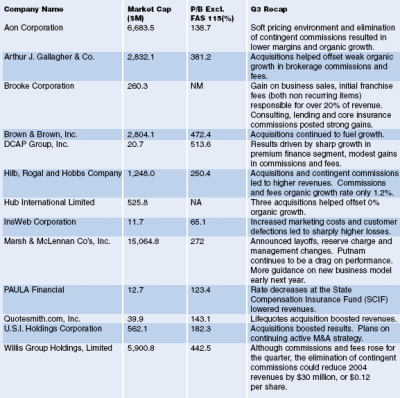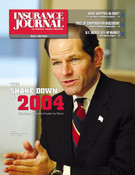The insurance industry continues to make the news even a month and a half after Attorney General Eliot Spitzer filed his lawsuit against Marsh and McLennan for bid rigging and receiving contingent commissions. Contingent commissions are highly profitable, partly because there are few direct expenses, if any, associated with them. As a result, their elimination disproportionately affects the bottom line of brokers who rely on them.
Subsequent legal actions and investigations by other attorneys general, state regulators and members of Congress have led to corporate restructurings and a paradigm shift in the way the industry operates. Marsh and McLennan CEO Michael Cherkasky plans to announce a new business model “which will be the standard for the industry” early next year although the exact form and financial structure still remain a mystery.
Winners and losers
The investigation will unveil a number of winners and losers. Spitzer for one should be considered a winner. His latest crusade against corruption should bolster his public appeal as he prepares to run for a higher political office. He officially announced his bid for the governorship of New York State on Dec. 7.

Other winners are the clients. Better disclosure, more competition and a renewed focus on serving the client will only help this group.
Losers on the other hand are the industry and its investors.

Small insurance brokers are certainly losers. They rely more on contingent commissions than their larger peers. Some may be acquired if they cannot come up with a viable business model that replaces contingent commissions.
Other losers will be state insurance regulators. This latest scandal bolsters claims for insurance regulation reform. An overzealous state attorney general appeared more concerned with eliminating contingent commissions and bid rigging than did the state insurance commissioners who provide oversight for the industry. Regulation of the insurance industry will likely remain on the state level however insurance companies may lose their coveted exemption from anti-trust laws.
Additionally, investors in the industry will be losers. In addition to the substantial losses of the previous month and a half, a more difficult operating environment on a variety of levels may limit gains going forward.
Current industry issues
Pricing environment. Investors are largely ignoring the weakening pricing environment resulting from increased competition as companies put to work huge surpluses built up over the past few years. The industry still faces a tougher operating environment even after the current legal and regulatory issues are resolved.
Increased marketing efforts. The industry is abandoning the standard practice of lowering rates in a soft market by increasing marketing activity to maintain and grow market share. For example, on a year-to-date basis Progressive Insurance Company’s advertising costs increased 33 percent compared to the same period last year. Most insurance companies do not break out marketing expenses on a quantitative basis like Progressive. However, a qualitative approach can be used to evaluate marketing activity. Companies like AIG and Allstate also recently began talking about increasing their marketing activities in quarterly filings.
Ratings downgrades. Moody’s revised the outlook on Aon’s senior debt and commercial paper rating to negative from stable as a result of the scandals. More downgrades may be on the way depending on the terms and structure of an eventual settlement, which will probably include the elimination on contingent commissions, profit disgorgements and massive fines.
Additional downgrades will limit access to the commercial paper market and have a material adverse effect on a company since it must maintain large cash balances to finance payments between insurers and their clients.
Contingent commissions. The virtual elimination of contingent commissions will impact smaller firms more than their larger peers. As mentioned above, smaller firms may be acquired if they cannot come up with a viable business model that replaces contingent commissions. Hilb Rogal and Hobbs Co. Chairman and CEO Mell Vaughan said on Oct. 26 that “there are a lot of mom and pop businesses out there and there are a lot in our industry that depend on the contingent commissions.”
Not only does the industry face massive penalties and fines but it may also be forced to give back ill-gotten revenue from receiving contingent commissions. Last year, Marsh and McLennan collected $845 million from these commissions alone. The company recently established a $232 million reserve to cover any potential settlement with Spitzer. This figure would not cover any other settlements or lawsuits.
Rebuilding reputation. The industry must rebuild the trust and confidence of its clients. This may be easier said than done. Fortune Brands recently dropped Marsh and McLennan as a result of concerns about its conduct. Renewals should be closely monitored next year to see if any other companies follow suit.
Investment outlook
The SNL Insurance Broker Index trades at 3.32x book value excluding FAS 115, up modestly from a low of 2.80x just two weeks ago but down significantly from 3.99x before the scandals. SNL tracks 18 publicly traded insurance brokers.
Expectations of a quick resolution and bargain hunting helped insurance brokers stage a modest rebound recently. Even though current low valuations reflect much of the previously reported bad news, further price appreciation may be limited until investors receive more color as to the terms and structure of an eventual settlement and the new business model. Investors may renew their focus on other fundamentals such as the deteriorating pricing environment as the scandals eventually stop making the headlines. A more difficult operating environment characterized by even greater competition on a more level playing field, as well as increased regulatory scrutiny all point to lower valuations going forward.
Bottom line: More favorable risk/return opportunities can be found elsewhere in the financial services sector.
John Leonard is a research analyst at SNL Financial LC. The firm is a leading financial information provider, specializing in the banking, insurance, financial services, real estate and energy sectors. He can be reached at (434) 951-7729, by e-mail at jleonard@snl.com or by visiting www.snl.com.
Topics Agencies Legislation Market
Was this article valuable?
Here are more articles you may enjoy.


 Kyle Busch and Wife Settle Lawsuit With Pacific Life and Insurance Agent
Kyle Busch and Wife Settle Lawsuit With Pacific Life and Insurance Agent  ‘Meaningful Decline’ in Industry Q1 Underwriting Profit Expected From Winter Storms
‘Meaningful Decline’ in Industry Q1 Underwriting Profit Expected From Winter Storms  What Berkshire’s CEO Abel Said About Insurance
What Berkshire’s CEO Abel Said About Insurance  Zurich Insurance Said to Near Beazley Deal Funded by Equity Sale
Zurich Insurance Said to Near Beazley Deal Funded by Equity Sale 



